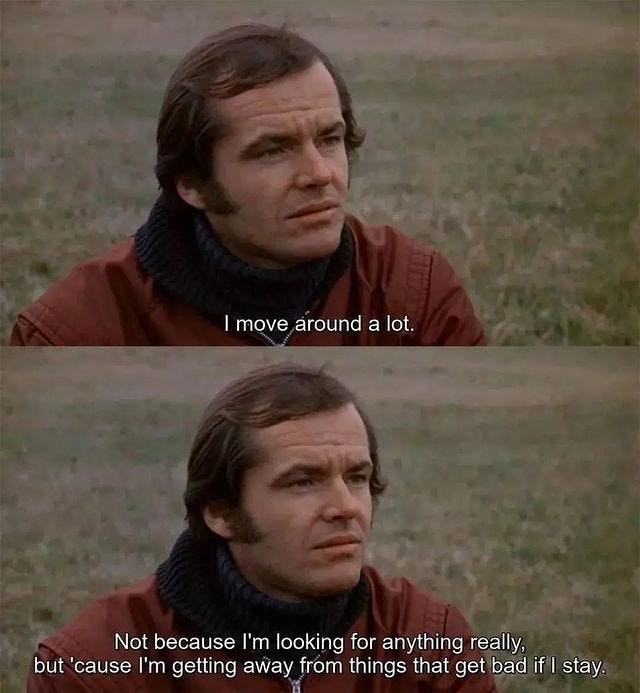In the year 2000, this film made the list of the “culturally, historically, and aesthetically” significant films in the National Film Registry.1 It certainly reflects its era in a number of obvious ways, from Jack Nicholson’s massive sideburns (almost the length of side whiskers, and deliciously thick) to car models and fashions. In more substantial ways, though, it is classical and timeless. The title itself is a reference to five classical pieces of music by Bach, Mozart, and Chopin. It feels some parts Kerouac, some parts Salinger. The main character, Bobby, played by Nicholson of course, can’t feel and longs to feel. Chopin’s Prelude, which he plays for Catherine, his brother’s girlfriend, does not even move him. Ironically, that’s the scene where I began to notice how far adrift this whole family is. They live on an island in Puget Sound. They are an island, resourceful, plentiful, but cut off. They are talented and intellectual, but lonely. Bobby left this island a long time ago in search of what he hardly knows what, to work on oil rigs and get drunk and have mindless sex that temporarily soothes the body but leaves the soul feeling more adrift than ever. He left a place of great natural beauty which might have moved him to serenity if he was capable of connecting with source and giving up resistance to the present moment. He ran away to find only filth. Filth everywhere, complains one of the hitchhikers he picks up on the way back to his family’s island home. She’s going to Alaska where she hopes to find a cleaner state of things. Bobby doesn’t seem to feel hopeful. For him, there’s pain in the present, disgust over the past that never measured up, and despondency about the future. He’s disconnected. He’s adrift.
I love the scene where he’s playing the piano for Catherine. As he plays the keys, the camera roams around the room, showing us a violin, and another violin, and many black and white photos of the family. We see nothing but disconnected coldness even as we are listening to some of the most beautiful music ever composed. The house is beautifully ornate, but frosty. There is nothing bad here, it’s just… not good. Carl, Bobby’s brother, is a career violinist who wears a neck brace and has limited mobility (Bobby mocks his funny walk) reminiscent of emotional limitations. Their father, also a violinist, is now rendered completely immobile by two strokes. The sister is detached as well and, thus, easy prey for the nurse who looks after the father. This silent and disengaged man massages her; his touch seems almost to take her by surprise. One doubts that she is technically a virgin, yet she seems alien to natural, beautiful things that occur between people who care for each other. It’s the same for Bobby. We know he’s not a virgin, but we also see his absolute paralysis in the face of honest feeling. When Bobby plays the piano for Catherine, she is moved to tears, but he admits he feels nothing. Her sensibility, though, seems to strike a new chord inside him. He awakens just enough (but not enough) to realize that there is something worth feeling. He can’t feel it, but he wants to. Like his sister, he’s now conscious that there’s something deeper than the meaningless forms of the world, but he’s afraid to go too deep. He is ignorant even of how deep it can go. Therapy for him cannot go beyond a short monologue to a father who cannot talk back. He’s honest, for once, even sheds tears, but his fear of vulnerability holds him back. Once he has this sliver of awareness, though—the sliver of awareness that he could fall in love and experience beauty—he cannot bear to return to living as he was. The present is impossibly awful without truth (and he’s too aware now to endure mendacity) and so he makes the choice to go on, alone, adrift, and without the warmth of even a coat.
Complete list: https://www.loc.gov/programs/national-film-preservation-board/film-registry/complete-national-film-registry-listing/. The addition of Five Easy Pieces among 24 others: https://www.loc.gov/item/prn-00-200/librarian-of-congress-names-25-more-films-to-national-film-registry/2000-12-27/.




Very astute observations... Really makes me want to revisit this classic... Thank you for sharing it!